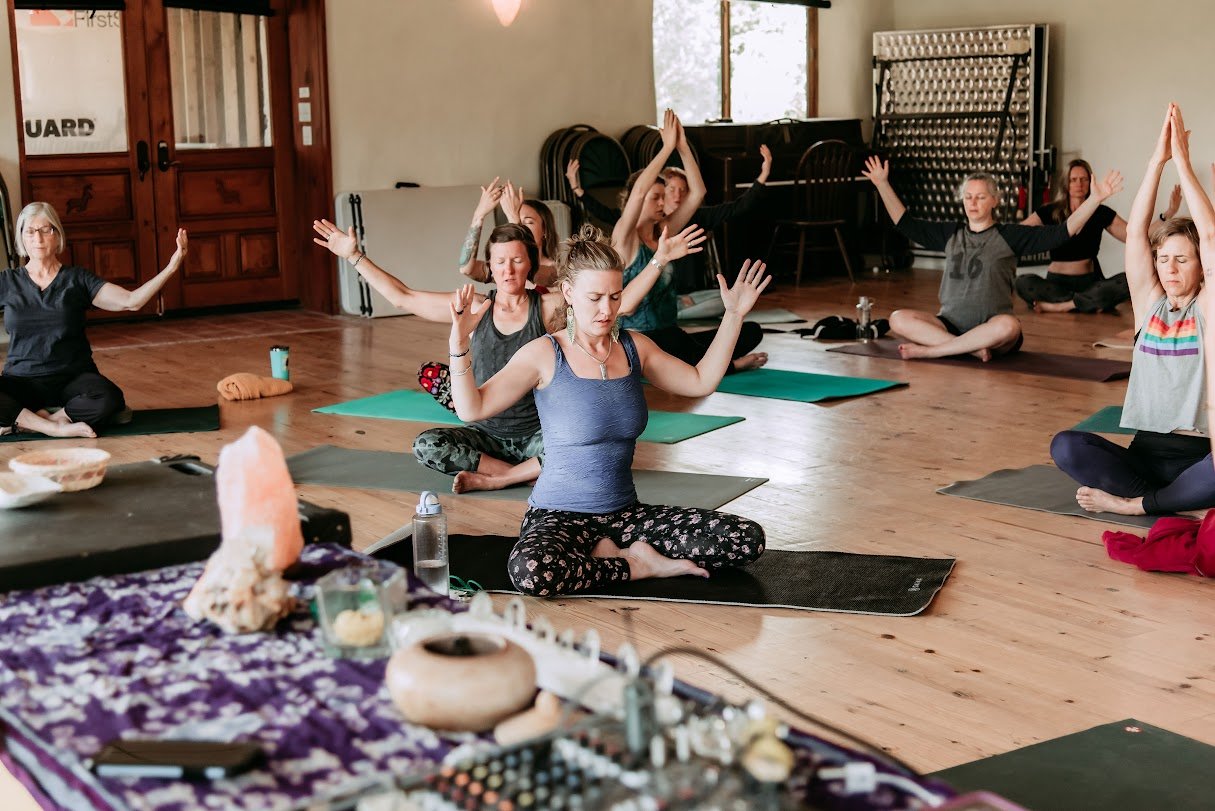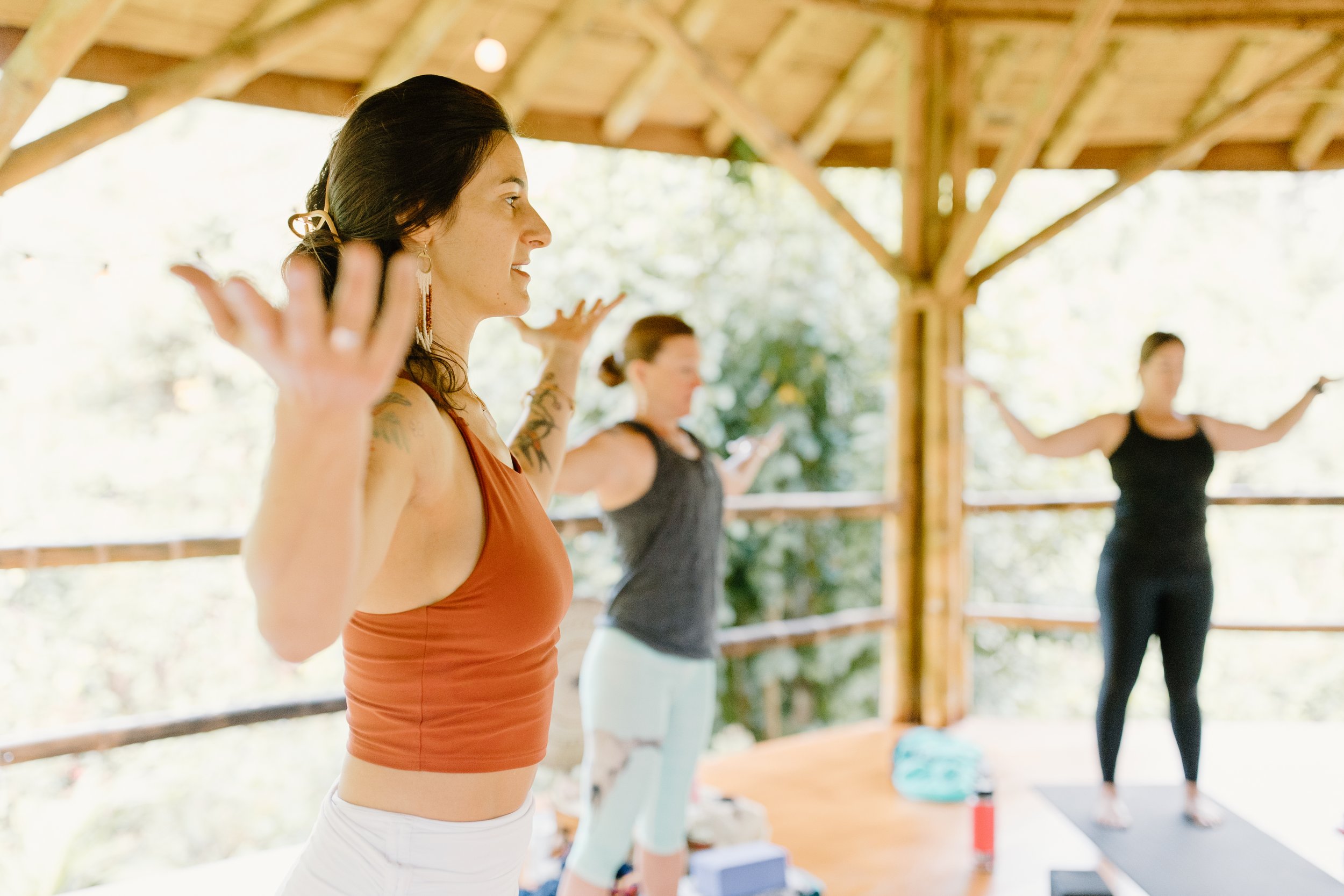When I was 22 I decided to become a yoga teacher. I was in love with how yoga made me feel and envisioned myself sharing the practice. At that time, I chose a training based on convenience: it fit with my schedule and budget and location. I didn’t really think much about what it offered and how it compared to other YTTs out there.
Fast forward 16 years, and now I know that all yoga teacher trainings are not created equal. There are a vast variety of YTTs available to choose from. By luck or by fate, I happened to choose a high quality training that was rich in lineage and gave me a very solid foundation. However, as the years progressed, I started to realize the style of yoga I was really drawn to and resonated with was quite different from the style I trained in. I love organic, intuitive, creative, flowing movement combined with breathwork, reverence, chanting, and meditation. This is why about 7 years subsequent to my first training, I did a second 200-hour training in Prana Vinyasa, which is still the kind of yoga I most resonate with and suits my personality and needs.
Over the years, I have heard friends rave about and rag about their yoga teacher training. So now when someone asks me about choosing a YTT, I really try to impress upon them the importance of taking the time to learn what you resonate with, and then look for a training that suits you. This starts with taking classes from a lot of different teachers until you really know what feels good to you, and what you don't really connect with.
Additionally, here are some really important questions to consider when choosing a training:
Who are the teachers and what are their accreditations?
In addition to finding a style that you resonate with, make sure you specifically resonate well with the main trainer or trainers. Even within one style of yoga, you'll find a broad array of nuances depending on the teacher. For example, I LOVE Prana Vinyasa, but there are certain Prana vinyasa teachers I truly love to take classes from, and some that I just don't have the same kind of personal connection with. And, in addition to resonating with their style of being and style of teaching, it's a good idea to look into what kind of and how much teaching experience the trainers have and what trainings they've taken.
What is the program's lineage?
If you find you like a style or a teacher, find out about their lineage. Remember that yoga comes from India and has been passed down through many different lineages as well as has evolved along the way. If you want to learn in a way that honors yoga's roots and pays reverence to the teachers and modalities it comes from, make sure the training you are considering has a culture of honoring these roots, as well as embracing the wisdom that evolution brings.
What is the Content and Focus?
It's important to look for the content and teaching objectives intended for your training. If the website does not list many, or you ask and don't get much of an answer, this is probably not a good sign. A teacher training that lacks a well-thought out plan and structure could prove to be very disappointing. It doesn't take THAT much to be accredited as a yoga teacher trainer, to be honest, although gratefully the standards were recently reviewed and updated and so yoga teacher trainings approved by Yoga Alliance are now subject to stricter standards. Also, the content and focus of various yoga teacher trainings varies widely. For example, some trainings are very alignment based and spend a lot of time in teaching very specific postural techniques. Some trainings are very workout focused and spend a lot of time on the physical practice but not much time on the many other facets of yoga such as philosophy, mantra, lifestyle, meditation, or pranayama. Some trainings focus on a very specific set of postures that the teacher is trained to teach in every class without variation, other trainings have varying degrees of creativity. Some trainings have a very particular focus, such as yin, ashtanga, kids yoga, restorative, prenatal, trauma informed, and more.
What is the format?
Are the 200 hours done all at once in a 3 week immersion? Or are they spread out across weeks or months? Having experienced both types, I can say that neither is better, but there are things to keep in mind about each. The immersive experience is life-changing in its own way because you get to take 3 weeks away from your usual responsibilities and habits and practice living the yoga lifestyle in a very structured way, doing yoga and meditation all day, getting up early, going to bed early, probably being fed a very healthy vegetarian diet, being surrounded by people who are all on a very high frequency with similar intentions as you. It can work well for some people who don't have major work responsibilities or young children at home, and it can be an amazing way to break some bad habits and start new ones. In my experience I felt absolutely amazing afterwards, living on a high that lasted for a couple weeks after the training but slowly diffused as I entered the real world and lost a lot of the habits I'd been practicing during the training. In contrast, my second training experience was spread out over 6 months, one full weekend each month. I realized during this experience the benefit of having time to practice and integrate the knowledge I was gaining. It is pretty challenging to retain a ton of new information when taken in a short amount of time, unless you have an absolutely incredible memory. I found the 6-month format to have a more lasting impact on my habits, my lifestyle, and my knowledge and understanding of the many facets of yoga. For a lot of people with regular daily work and family commitments, this format is a lot more accessible too, plus usually, you can work out a payment plan spread out over the months of the training rather than pay all at once for the 3-week immersion.
Is it Yoga Alliance approved?
I mentioned before about what it takes for a yoga school or teacher trainer to be accredited. I was referring to the most well-known and generally well-respected governing body for yoga teacher trainings at least in America, Yoga Alliance. Although it's a free world and anyone could offer YTT without Yoga Alliance accreditation, if you are thinking about teaching in a yoga studio after graduation, yoga studios these days will probably want to see that your training is approved by Yoga Alliance because they will know that there has been some oversight into the content and structure of your training that they can trust. I am aware that there are other organizations accrediting yoga teacher trainings, but as far as 200-hour trainings go, at least in the US, Yoga Alliance is definitely the most well known and generally most well thought of.
Is it in person or online?
This question is one I can hardly believe I have to include because I personally have a big issue with online yoga teacher training. Yes it has been done, and some people who lead them or who have done them give them good reviews, but to me it’s obvious that trying to learn to teach yoga on a computer has major limitations. Yoga is such a nuanced, energetic, sensitive practice, meant to reconnect us to what is true and real. Spending 200 hours in front of a screen, without any physical connection with your teacher, any physical feedback for adjusting your or your student's posture, just lacks so much depth. Not to mention, one of the most beautiful parts of a yoga teacher training are the friendships you make with your classmates and personal relationship you develop with your teachers, which is naturally going to be very constrained in a virtual program. Granted, during the pandemic, many people had to make do with online events because it was the only way most people could connect, but I am truly hoping that this temporary solution dissolves and we get back to real, live, community-oriented connection with each other.
How many students?
A final point I'd like to make is considering the size of your training group. A huge class size means less connection with your teachers, less time to get your questions answered, and less chance of having your teachers give you personal feedback. Large group events also make it generally harder to maintain a relaxed, balanced nervous system state, ideal for retaining information, forming connections, and staying vital and healthy. Personally I like to keep my trainings small for these reasons.
So hopefully you have some good points to ponder and keep in mind if you are now or find yourself in the future looking into become a yoga teacher and choosing a yoga teacher training. I highly recommend yoga teacher training for anyone who is interested in deepening their practice and experience of the yoga lifestyle, whether it is with the intention to teach or simply for deep personal transformation.
I'm currently gearing up to lead a 200 hour Prana Vinyasa Yoga Teacher Training from June to October, and I highly suggest anyone who considers joining it take classes with me and or have a conversation with me to really make sure that this particular training is right for them. I don't recommend it for everyone and I celebrate the diverse array of people and training options out there. If I honestly feel like a person would be better suited to a different type of training, I will tell them that and make another suggestion for them. I want the people who join my trainings to be truly happy they did because this style, this format, my presence and the presence of my guest teachers really resonates with them and their values. So if you are interested please reach out and and let's chat!
Please note that I am offering a BIPOC and teacher scholarship for this training, and also offer payment plans and am willing to consider trades.




